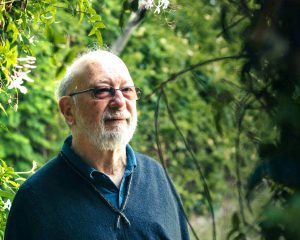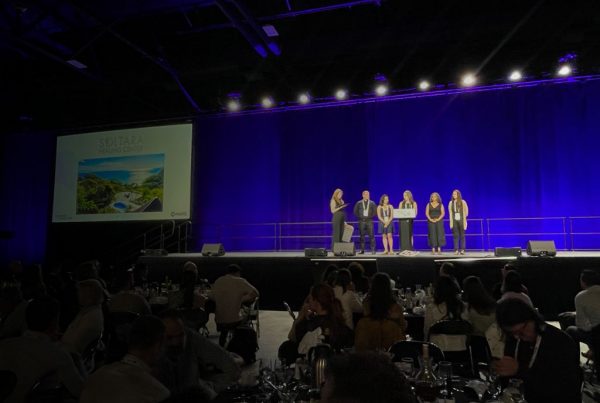 Dr. Dennis McKenna makes a case for why ethnopharmacology is one of the most critical life-sustaining disciplines of our times (and what that’s got to do with ayahuasca).
Dr. Dennis McKenna makes a case for why ethnopharmacology is one of the most critical life-sustaining disciplines of our times (and what that’s got to do with ayahuasca).
Symbiosis is hands down one of the most important driving principles of the natural world. If we want to live in alignment with our outer ecology for the evolution of ALL species, we must not only understand how symbiosis works but begin to live and breathe it like our life depends on it! In other words, “the entire biospheric community of species is conscious, and seeks to advance the evolution of consciousness through collaboration and symbiosis.” These are the words of a true luminary in the ayahuasca and plant intelligence world by a man who needs no introduction – Dr. Dennis McKenna. For those newer to his work or needing a refresh of why we’re here to talk about him today, read on.
Dennis McKenna has conducted research in ethnopharmacology for over 40 years. For starters, this field is defined as “the scientific study of substances used medicinally by different ethnic or cultural groups,” which includes ayahuasca as well. He is a founding board member of the Heffter Research Institute, and was a key investigator on the Hoasca Project, the first biomedical investigation of ayahuasca. He is also the younger brother of Terence McKenna. From 2000 to 2017, he taught courses on Ethnopharmacology and Plants in Human Affairs as an adjunct Assistant Professor in the Center for Spirituality and Healing at the University of Minnesota. Dennis is also hosting an exciting symposium this month called the ESPD55 (Ethnopharmacologic Search for Psychoactive Drugs), a historic four-day symposium including speakers like Paul Stamets (Mycologist), Monica Gagliano (Evolutionary Ecologist), Wade Davis (Anthropologist) and Dr. Andrew Weil (Medical Doctor). He is also a trusted advisor to Soltara Healing Center, for which we’re forever grateful.
Here at Soltara, we are always striving to be a bridge between the Global North and South as we bring Shipibo-led, trauma-informed ayahuasca healing to people ready to work with this medicine from around the world. In our mission to unite indigenous and non-indigenous cultures, we hope to shine a light on plant intelligence and other valid ways of knowing and healing, alongside Western medicine and science. To that end, we sat down with Dennis McKenna to unpack some of the most pressing questions of our time as it relates to sustaining our collective evolution through the lens of psychoactive catalysts and the traditions they come from.

Three key reasons why we should apply ethnopharmacology to our present and future thinking
Here are three core takeaways about why it is more critical than ever before to elevate the study of Ethnopharmacology and further unpack the symbiotic relationship between humans and their plants, fungi and animal companions.
- In a post-pandemic world characterized by systems collapse on all levels (ie: climate change, loss of biodiversity, post-globalization), ethnopharmacology becomes an ever more critical field of study to help us reimagine and reprioritize the sustenance of all living beings. As Dennis points out, “Any piece of information you can tag to a plant, fungus, or animal that people encounter and use, in some way enhances the value of that thing from the human perspective. It gives a reason to not drive it to extinction [and] every plant has a value in and of itself within the ecology it operates in, whether we think so or not.” The problem today is that our capacity to collect, preserve and make meaning out of living entities is in grave jeopardy due to modern day capitalism and extractive industries that take more than they give. Without continued knowledge of other intelligences, we are robbing ourselves from many things – evolution for one, but also potential new discoveries in medicine and the ability to know what we currently don’t yet know.
- Landmark conferences like the upcoming ESPD55 are a direct reflection of the power of symbiosis, and feed into the ecosystem that power up new discoveries, refocus mental health conversations, and cross-pollinate cutting-edge ideas. This upcoming symposium that we’re particularly excited about for reasons we’ll share later is a fruitful history in the making. For one, the first symposium of this series took place in San Francisco in 1967 prior to psychedelics becoming stigmatized or prohibited. It came onto the scene precisely because the National Institute of Mental Health understood the value of studying psychoactive drugs and wanted to unlock new discoveries for mental health ailments. Then, the War on Drugs came along and pulled the plug on all psychedelic study. The plan to run the ESPD symposium every ten years became instantly obsolete. What remained was a book published from the ESPD67, which in addition to the influential work of Carlos Castaneda, became the seminal texts for why Dennis chose to become an ethnopharmacologist. Decades went by and finally in 2017, you could say the very phenomenon of symbiosis led Dennis and others to revive the ESPD17. Fast forward the tape, the third in this series is happening May 23-26!
- With ever-greater curiosity about space travel and otherworldly entities, how about resetting our collective imaginations on the central question: “How does plant intelligence actually work on a biospheric level, in the sense that intelligence comes in forms beyond nervous systems and brains to hyper connected networks the size of forests and planets? And what does this mean for the longevity of the human race?” This may be the most exciting question of our times, especially as we head into the ESPD55 Symposium. By putting our preconceived notions of what “intelligence” is aside, we could unlock a greater definition that by virtue opens up infinite possibilities for healthcare discovery, longevity as a collective biospheric entity, and healing for our burned-out-sicker-than-ever society.” We have more solutions than we think – we simply need to accept (and get excited about!) the fact that we don’t yet know what we don’t yet know. As Dennis goes on to say, “What we’re finding is you don’t need nervous systems or brains to have intelligence. You need these hyper connected networks and they can be the size of forests and planets. These are intelligent entities…how about giving more attention to earthly intelligence (not just alien intelligence)? If we believe that the solutions we get depend on the questions we ask, we should make a case for asking the bigger and bolder questions to become the agents of change we want (and need) to see.

What to expect from Dennis McKenna’s Symposium
Notable ESPD55 talks that we’re particularly jazzed about include ayahuasca and other medicinal plants. There’s a whole host of brilliant talks (37 to be exact), but the ones we’re most excited about?
- “Medicine for the Future: If We Listen, Plants Will Teach Us” by Monica Gagliano
- “The Therapeutic Potential of Coca” by Dr. Andrew Weil
- “Revising the McKenna Stoned Ape Theory: The ever evolving case for its plausibility” by Paul Stamets
- “Ayahuasca, Shamanism and Conservation in the Sibundoy Valley of the Colombian Amazon” by Mark Plotkin
We all have a part to play in protecting, preserving and promoting the indigenous cultures, practices and plants that support the shared home that we have. Alongside science and Western ways of knowing and understanding, we invite you to take a step towards the integration of the other half of the equation – the indigenous lens that holds equally powerful wisdom for the health of our present and future.
The ESPD55 is coming up May 23-26th. They’ll be live streamed from St Giles House, UK. Check them out and we’ll see you there!






